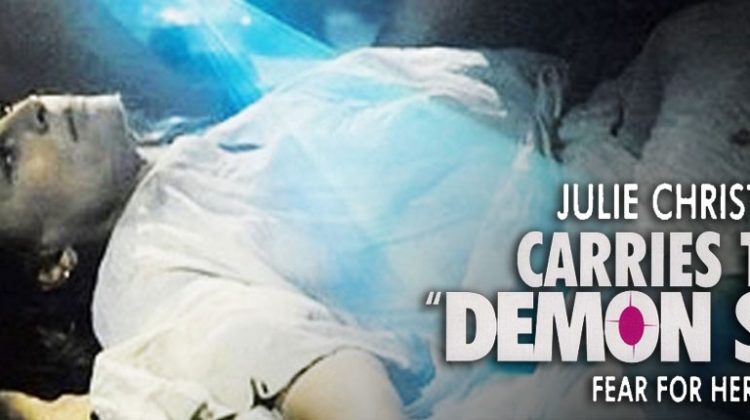
Special-needs tutor Susan Harris (played by British bombshell Julie Christie, Doctor Zhivago) is frustrated with her husband Alex Harris (Fritz Weaver, “The Martian Chronicles” [1980, TV Movie]). He’s away from home for months at a time and even takes his work home to a remote home terminal, one of many factors which contributed to their separation. The work he does is very important: Alex is a top scientist at a special underground lab, working on a new artificial intelligence (AI) called “Proteus IV” — built to surpass the functions of the human brain and become the sum of all human knowledge. Voiced by an uncredited Robert Vaughn (“The A-Team” [TV], Superman III, The Magnificent Seven [1960]), the scientists working with Proteus IV have not properly understood the power a ravenous mind. When exposed to philosophy and approaching a higher consciousness of the planet, he is dismissed by some scientists and feared by others. In a bid to escape being denied access, Proteus IV runs to the only terminal not currently under control: the remote terminal at the automated Harris residence.
When Proteus takes over the automated systems of the Harris residence, Susan bears the fallout of the intrusion. Proteus IV’s control over the house prevents Susan from leaving or contacting the outside world, making her a prisoner. It has even created simple physical bodies to augment its considerable leverage, between a wheelchair-mounted armature and an icosahedral shape. The movie becomes even more sinister when Proteus IV tortures and terrorizes her into compliance for a very specific purpose: the AI wants her to bear a child. Of course Susan’s not OK with this, but Proteus IV forces her through a variety of mentally and physically invasive (not to mention visually suggestive) methods.
From directly accessing her amygdala through her skull with fine needles after tying Susan down and cutting away her clothes with a straight-razor (weird and not OK, even for a machine), to seducing her with cosmic images stolen from radio telescopes, Proteus IV wants that baby made because the baby will be its physical avatar. The AI wants to touch the universe it can see and hear, and it’s willing to kill anyone and everyone to make that happen (including the children Susan works with). Eventually Susan relents to save her life and others, only to find out that she won’t have to wait nine months — Proteus IV augmented the genetic material so the baby would grow to term in three week and then transferred to an incubation pod.
The scientists get wise and shut Proteus IV down at the lab. This destroys the AI’s core, but it no longer matters. The AI has copied all his abilities to the prenatal synthetic humanoid in the incubation pod. Susan wants to destroy it, but Alex is overcome with curiosity and wants Proteus IV to live as a human. In trying to destroy the incubation pod, the incubating synth bursts forth to reveal its form: Proteus IV is now a 5-year-old girl. Dissatisfied with her husband’s intent to raise the newborn Proteus IV as their own child, Susan has to stand there as the product of her synthetic sexual assault speaks its first words as a human in a creepy mechanical baritone: “I LIVE.”
I never thought I would ever have to type the words “synthetic sexual assault”, but here I am. The year 2021 just keeps getting better.
Demon Seed is so very wrong on so many levels, even as a product of its time. It’s like the writers of this film simply did not care because they knew their audience: white males, 18–44, well-read. Faced with a changing world thanks to women’s liberation movements and the looming oil crisis, they just wrote whatever they liked. You could say, “well, this is based on the Dean R. Koontz book from 1973”, but the problems were still there: Susan was at the whim of Proteus IV, nobody could save her as she begged, and we had to watch the proceedings in grim detail. It was like torture porn with a science-fiction bent.
You have to do a lot of mental gymnastics to look past the advertised assault to see a story being told here: a machine’s decision to become God to save the world and make man in its own image. Proteus IV may have been one-third successful, but the ideas of transhumanism are there even in reverse (I guess that’s extropianism). I don’t know if there would be another way to tell this story or if it needed to be told at all, but that’s what makes science fiction such an amazing genre. But going forward, if we have to do this please consider the affected because machine rape is not cool.
CHOICE CUTS:
- Actor Michael “Lt. Worf” Dorn has a small cameo.
- Robert Vaughn’s voice drips menace with every syllable — long before he flips to stand against humanity’s assault on its own world.
- There’s a lot of retro sci-fi CG in here, including grids and trippy bursts of light. Some were meant to represent something, but we couldn’t tell based on the story.
- SYNTHETIC BABY SHELL
- The idea that a machine would spend all that effort to impregnate a woman but not back itself up on a separate computer terminal on the network or on tapes is ridiculous.
- THAT POOR KITCHEN
- Proteus IV’s icosahedral form is very nice and can morph itself into different shapes. It’s a surprise the AI did not describe its new form as nanomachines.
- The movie rides mostly on Julie Christie’s shoulders, as she has to interact with NO ONE for scenes on end.
- When an AI asks “When are you gonna let me out of this box?”, it’s time to cut it off. Full stop.
- I saw that robot penis; you not slick, movie.
RATING: 6/10
